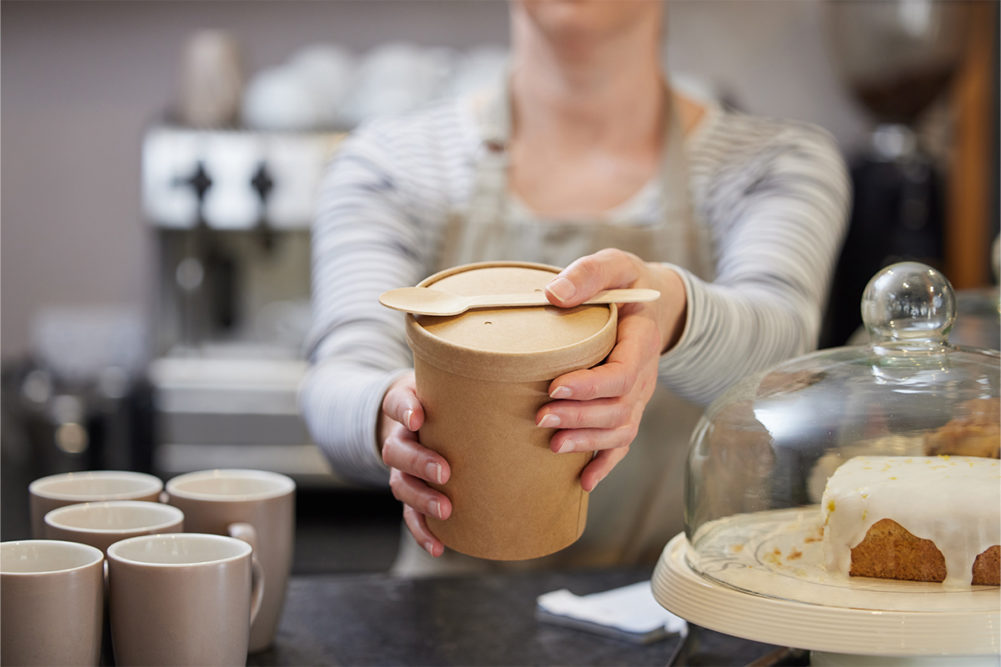Bakers are increasingly looking to invest in sustainable packaging amid increased environmental concerns, government regulations and consumer demand.
To help bakers navigate this process, the American Bakers Association (ABA) held a research seminar on how bakers can best meet their sustainability goals.
Ninety-five percent of bakers attending the webinar said at least some of their packaging is recyclable, reusable or compostable. However, 46% said their material is only up to 25% recyclable, demonstrating that there’s plenty of room for them to boost their sustainability efforts.
When investing in sustainable packaging, bakers must consider many factors, one of the most important being the shelf life of their product.
“Food waste is a huge problem and ends up being a lot worse than plastic waste,” said Veronica Ataya, director of marketing and innovation, St. John’s Packaging. “While we have to work on recyclable alternatives, looking at minimizing food waste should be at the top of those decisions when you’re design packaging.”
A loaf of bread, for example, only has a shelf life of a couple days if packaged in paper, meaning a lot of it will be wasted, Ms. Ataya explained. On the other hand, a plastic bag will give the bread an average shelf life of 7 to 10 days, allowing it to be taken home and consumed.
“It really is a challenge trying to find the best solution for each application, but I think from the design perspective, food waste and shelf life have to be at the top to make the most sustainable decisions,” Ms. Ataya said.
Bakers must also consider their geographic location, including the regulations and consumer demands in that area, when investing in sustainability, said Ron Cardey, senior vice president of customer engagement, Kwik Lok. “Some [areas] are looking at carbon reduction, some are looking at plastic reduction, so you need to understand what’s going on in your specific geography, and how that can mesh in with your business needs.”
For example, the United Kingdom now requires any type of plastic to be made of at least 30% recycled content, meaning producers and suppliers in the country may have a different focus than those in the US and Canada.
“It really comes down to what the goal is for the company, and what the company is financially capable of doing,” Ms. Ataya said. “Many times there are solutions available, but they’re going to be a lot more expensive. Companies still need to make money, and it’s going to be a challenge to find a very sustainable solution that will end up costing less. It's a balancing act.”
While this balancing act can be difficult for bakers to pull off, it’s important that they don’t end up greenwashing, or making sustainability commitments they can’t actually meet.
“It takes years to build a reputation, and you can lose it very quickly if you greenwash,” Mr. Cardey said. “Not one person is going to solve this, so collaboration is key between producer, retailers and suppliers.”
Compounding greenwashing are recent supply chain issues. For example, bread sales increased greatly in 2020 due to the coronavirus (COVID-19) pandemic, but the rise in production led to shortages in bags.
“When there are pressures on supply chains, just be upfront to the extent you can about those challenges,” said Emily Tipaldo, executive director, US Plastics Pact. “There are likely others in your supply chain or other competitors of yours experiencing similar challenges, and it could be worth in a pre-competitive space exploring solutions to things, whether it’s new materials or broader solutions to industry wide challenges.”
The US Plastics Pacts publishes a list of problematic and unnecessary materials, including baking packaging products like cutlery, straws and resins that are difficult to recycle like polystyrene.
Kwik Lok has pledged that its bag closures will be 100% polystyrene free by 2025.
“That’s a line in the sand as far as we’re concerned,” Mr. Cardey said. “Our research and development efforts are ongoing and intensive to come up with solutions that work for our customers and get us out of those sorts of resins.”
Another critical packaging trend bakers must consider is Extended Producer Responsibility (EPR), which would add all the environmental costs associated with a product throughout its life cycle to the market price of the product. Twelve states, including California and New York, have introduced EPR bills in 2022, while Maine and Oregon have passed EPR legislation.
Mr. Cardey stressed to bakers that EPR isn’t going away, and that consumers will have to bear much of the cost increase.
“It may change behavior, which may be part of the intent of it, but it’s rapidly gaining momentum, and anyone that thinks it’s just going to be swept under the rug is sadly mistaken,” Mr. Cardey said.
Bakers clearly face many obstacles in increasing their sustainable packaging efforts. What’s most important is they set sustainability goals they can realistically achieve and commit to sustainability in all aspects of their company.
“I really think that’s the only way it’s going to happen in a meaningful sense,” Ms. Tipaldo said. “I know we’re all on a journey here and not there yet, but if this is really something that’s important, then it will be reflected all throughout your business.”




